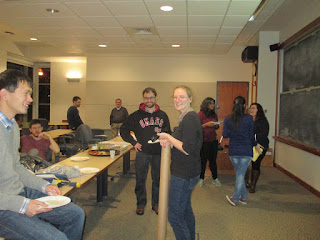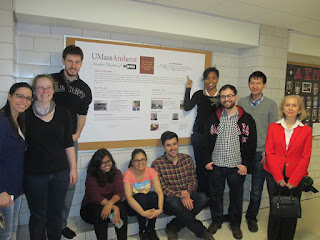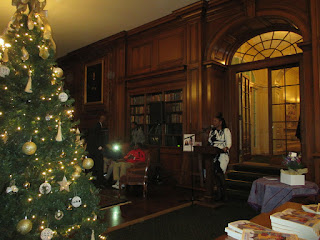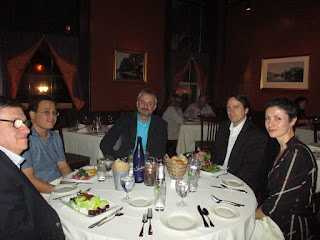As the Center's Director, reflecting on the Associates' accomplishments is always enjoyable and helps us to synergize our energies as a team and to take on new challenges in the coming year.
2015 was an exceptional year in terms of grants, research accomplishments from humanitarian logistics to cybersecurity, awards and recognitions received, as well as impact of our work. Below I provide a few of the highlights.
Center Associate Dong "Michelle" Li successfully defended her doctoral dissertation at the Isenberg School of Management on May 4, 2015 and the title of her thesis was "Quality Competition in Supply Chain Networks with Applications to Information Asymmetry, Product Differentiation, Outsourcing, and Supplier Selection." She is now an Assistant Professor of Supply Chains / Operations Management a the College of Business at Arkansas State University and was featured on her university's homepage. The 400 page book, Competing on Supply Chain Quality: A Network Economics Perspective, authored by Michelle and me will be published by Springer in February 2016. In addition, our recent research on supply chain competition in quality and supply chain performance assessment and importance indicators appears in the following publications:
A General Multitiered Supply Chain Network Model of Quality Competition with Suppliers, Dong Li and Anna Nagurney, International Journal of Production Economics 170: (2015) pp 336-356, and
Supply
Chain Performance Assessment and Supplier and Component Importance
Identification in a General Competitive Multitiered Supply Chain Network
Model, Dong Li and Anna Nagurney, in press in the Journal of Global Optimization.
Center Associate Professor Tina Wakolbinger of the Vienna University of Economics and Business in Austria serves as the Head of the Research Institute for Supply Chain Management there. Her research project funded by the Austrian Science Fund (FWF) is on: Optimal Pricing and Contract Design in Humanitarian Logistics and will continue until 2016. A writeup on her research on humanitarian logistics appeared in scilog, a publication of FWF. At the EURO conference in Glasgow, Scotland, July 11-14, 2015, she organized the invited session: Coordination and Cooperation in Humanitarian Supply Chains, at which Center Associates Professor Amir H. Masoumi of Manhattan College presented a paper with Center Associate Min Yu of the University of Portland, and me entitled: "An Integrated Disaster Relief Supply Chain Network Model with Time Targets and Demand Uncertainty." The paper appears in the edited volume: Regional Science Matters: Studies Dedicated to Walter Isard, P. Nijkamp, A. Rose, and K. Kourtit, Editors, Springer International Publishing Switzerland (2015), pp 287-318. The Nobel laureate and renowned economist Paul Krugman also has an invited chapter in this volume.
Center Associate Professor Patrizia Daniele of the University of Catania had a very eventful year scientifically. In addition to organizing the stream “Recent Advances in Dynamics of Variational Inequalities and Equilibrum Problems”, for EURO 2015, Glasgow, she was also a Member of the Program Committee of the 2nd International Conference on Dynamics of Disasters, Kalamata, Greece, June 29 – July 2, 2015 and a Co-director of the International Workshop “Variational Analysis and Applications", Erice, Italy, August 28 – September 5, 2015. I had the pleasure of co-organizing the Dynamics of Disasters conference, along with Professor Panos M. Pardalos of the University of Florida and Professor Ilias Kotsireas of Wilfrid Laurier University in Canada. Professor Wakolbinger was also on the Program Committee and presented a paper there. I presented the paper: A Mean-Variance Disaster Relief Supply Chain Network Model for Risk Reduction with Stochastic Link Costs, Time Targets, and Demand Uncertainty, co-authored with Center Associate Professor Ladimer S. Nagurney of the University of Hartford, which will appear in Dynamics of Disasters, I.S. Kotsireas, A. Nagurney, and P.M. Pardalos, Eds., Springer International Publishing Switzerland. Indeed, we are now in the process of editing a volume on the theme of the conference, under contract with Springer.
We completed our 4 year National Science Foundation (NSF) project on ChoiceNet: An Economy Plane for the Internet. This project was part of NSF's Future Internet Architecture (FIA) program with our grant titled: NETS Large: Collaborative Research: Network Innovation Through Choice.The University of Massachusetts Amherst was the lead and Professor Tilman Wolf, Associate Dean at the College of Engineering, and I collaborated with our colleagues at the University of Kentucky, NCState, and RENCI. Isenberg School Doctoral Student Canter Associate Sara Saberi was funded by this grant for two years. Sara last year was selected to take part in the doctoral colloquia at POMS, at INFORMS in Philadelphia, and at DSI in Seattle. She also received a WORMS (Women in Operations Research and the Management Sciences) Travel Award to attend the Philadelphia conference. She successfully defended her doctoral dissertation proposal in 2015.
In addition, we were very pleased to receive another grant from NSF, working again with Professor Tilman Wolf, at UMass Amherst. We continue to collaborate with our University of Kentucky colleagues. The new project, funded under the EAGER program, is: EAGER: Collaborative Research: Enabling Economic Policies in Software-Defined Internet Exchange Points.
Center Associate Professor Patrick Qiang received tenure and was promoted to Associate Professor at the Graduate School of Professional Studies at Penn State University so big congratulations are in order! He was the track chair in International Business at the NEDSI conference in Cambridge, MA in March 2015.
The INFORMS Conference in Philadelphia, November 1-4, 2015, served as a wonderful venue at which many of the Supernetwork Center Associates organized sessions and delivered papers, including: Professors Jose M Cruz of the University of Connecticut and Trisha Anderson of Texas Wesleyan University, who continue their great work on supply chains, sustainability, and corporate social responsibility, collaborating often with Center Associate Professor Zugang "Leo" Liu of Penn State University Hazleton. Professor Dmytro Matsypura of the University of Sydney Australia also presented at this conference as did Center Associates Professors Min Yu, Dong Li, and Amir H. Masoumi, and Doctoral Student Center Associates Shivani Shukla and Sara Saberi.
And, at the INFORMS Philadelphia conference, the UMass Amherst INFORMS Student Chapter, which I have served as the Faculty Advisor of going on 12 years now received the Summa Cum Laude Award from INFORMS at a special ceremony. Many Center Associates, who have been doctoral students at the Isenberg School of Management, have served as officers of this Student Chapter.
Professor Cruz has had another truly exceptional year and in 2015 received the following awards from the School of Business at the University of Connecticut:
· 2015 PMBA OPIM Teacher of Year
· 2015 Distinguished Service Award
· Ackerman Scholar, 2014-2016.
2015 was a very significant year for our work in cybersecurity. Doctoral Student Center Associate Shivani Shukla was very busy presenting our latest cybersecurity research at a variety of venues. She was awarded a first prize for her poster by the Air Force Association on September 22, 2015 at UMass Lowell. The title of her poster presentation, which was joint with Professors Daniele, Ladimer S. Nagurney, and me, was: "A Game Theoretic Model for Cyberecurity Investments with Nonlinear Budget Constraints."
We published several papers on cybersecurity in 2015:
A Supply Chain Game Theory Framework for Cybersecurity Investments Under Network Vulnerability, Anna Nagurney, Ladimer S. Nagurney, and Shivani Shukla, in Computation, Cryptography, and Network Security, N.J. Daras and M.T. Rassias, Editors, Springer International Publishing Switzerland (2015) pp 381-398;
A Game Theory Model of Cybersecurity Investments with Information Asymmetry, Anna Nagurney and Ladimer S. Nagurney, Netnomics 16(1-2): (2015) pp 127-148;
A Multiproduct Network Economic Model of Cybercrime in Financial Services, Anna Nagurney, Service Science 7(1): (2015) pp 70-81.
Many thanks to the Supernetwork Team for another tremendous year!
Some additional highlights of our activities can be found on the Supernetwork Center's media page.
For our recent publications, click here.









































































